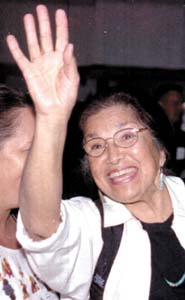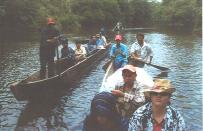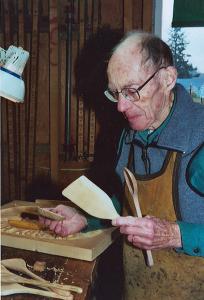In this Spring, 2004
edition of ¡Abrazos! de Mulukukú
you will find,
[The photos below have been reduced in size. You
may view them full size by simply clicking on them.]

 |
|
Photo courtesy of
Dr. Serena Yang
|
Dear Friends,
Warmest greetings to
each of you, our friends and partners.
I
write from the Women’s Center house in Managua, where patients
are housed while being treated in the capital and where all central administration
is based. I am happy to update you on the events of the past months and
our progress last year. Yet first, I would like to share with you the stories
of two patients who recently sought treatment for pre-cancerous cervical
lesions. The social differences between the two women are striking.
Gloria
Palacios Rivas is 36 years old and lives with her common-law husband, Noel,
and their children in a borrowed house in Ciudadela, a fairly new settlement
built for de-mobilized Contras, on the outskirts of Mulukuku (though Noel
was not in the Contra). Gloria has never practiced family planning, explaining
that she always lived far from services. As we chat, she breast-feeds her
one-month-old daughter, Gloria’s eleventh child. The baby is beautiful
with a thatch of black hair and a small, well-formed body. Her bright,
black eyes are open as she pulls lustily at her mother’s large, dark nipple.
Gloria
was born in the Department of Jinotega. Her father died when she was 12
years old, and she left home to find work. She met Noel and, at 13, gave
birth to their first child. One child died at age 5 from ‘’fiebre de lombrices”’
(fever caused by worms). Neither the parents nor their children have ever
attended school. Noel reads and writes a little and teaches their children
what he knows. The family works as migrant laborers, traveling about the
country to find work, either picking coffee or working as day laborers
on farms. Noel injured a knee and cannot work with a machete. The older
children have left home to seek their own survival.
Gloria
attends a fundamentalist chapel where women are forbidden to use contraceptives.
Gloria
first came to the clinic two years ago and had a Pap test which showed
advanced pre-cancer of the cervix. She did not return for the results,
though notified several times. In the second year after her Pap she came
to the clinic but was pregnant with her 11th child and couldn’t be treated.
We are very concerned that her disease has advanced in these three years
and anxiously await the pathology report.
Gloria
supports her family of eight by washing and ironing clothes, earning 200
cordobas a month ($12.77). She was given a hen recently but it disappeared
during the night, taken by a neighbor. A daughter has just found housework
and will contribute another 200 cordobas a month. When asked how she manages
to feed her family she answered: “Many days we eat only tortillas with
salt.’’ I asked what hopes she had for the future and she answered, ‘sobrevivir’
(to survive).
Ana Maria Castillo Vega is 28 years
old, and the mother of five children, all of whom attend school. She and
her husband are literate. They have been married for 15 years and together
decided to practice family planning. The family is Roman Catholic and she
understands the official position of her church regarding family planning,
however, “the priest hardly mentions the subject.” They live in a new community
in the mountains, El Naipe, several hours from Mulukuku. The couple
worked a piece of land for several years and, with sweat equity, was able
to purchase 20 acres.
This
farm provides all the food the family needs.  They
sell their extra crops and cows to buy chickens and pigs, the pig serving
as the “campesinos’ bank.” The family never lacks for food and has fresh
milk, cheese and eggs daily and meat whenever they wish.
They
sell their extra crops and cows to buy chickens and pigs, the pig serving
as the “campesinos’ bank.” The family never lacks for food and has fresh
milk, cheese and eggs daily and meat whenever they wish.
Ana
Maria came to the clinic for the first time just two months ago, a Pap
was taken and she returned for the results on the date assigned. Because
she is receiving early treatment, she will not develop cervical cancer.
I asked Ana Maria how she happened to come to our clinic. She responded,
“People say the care here is good.”
DEATH OF A FRIEND
We
were saddened to hear of the untimely death of our dear friend, David Waller.
David was a Methodist minister, fisheries expert, father and husband. David
made many visits to Mulukuku beginning in 1988 while the war was still
raging. He supported the health and education of our children. David’s
humor and joy were his hallmarks. At the hour of his funeral service in
Warsaw, Missouri, we, his Mulukuku friends, joined in giving thanks for
his life. His widow, Mary, asked that memorials be made to the Women’s
Center.
DELEGATIONS
The
first three months of 2004 have been very busy. In February, we hosted
two groups from the American Jewish World Service (AJWS). The first was
a group of young professionals and the second undergraduate students
from Brandeis University. Both delegations worked extremely hard, in spite
of the punishing sun. They assisted in the medicinal plant garden, with
reconstruction of the hurricane battered basketball court, painting the
refuge house (while making good friends with the girls in the shelter)
and wiring and building a sound room for the new radio station. They still
had energy to dance in the evenings.
This
is the second year that AJWS has sent delegations. The young people and
adults in Mulukuku learned about Judaism and Jewish social justice. The
AJWS delegations shared that meeting our empowered community, and working
with us in solidarity, inspired them and showed them new paths to connect
to their own culture and traditions. We were especially moved when we were
invited to take part in the delegations’ Shabbat rituals. Histories of
suffering seem to transcend class, religion, race and geography.
Dear
friend, Greg Houston, dentist and professor of the Dental School at the
University of Missouri brought, for the 7th year, a delegation consisting
of another dental professor, students and support workers. Many of the
helpers are old friends of Mulukuku. In five days, the grouped served
several hundred people.
A
delegation from the Women’s Empowerment Network in Santa Cruz, California
visited Mulukuku to learn first hand about the work of the Cooperative.
This was the first visit of friends who have supported us for more than
13 years! The delegation brought shelving for the operating room storeroom.
We especially appreciated the visit, since WEN has done so much for us
with their continuous backing, encouragement and aid.
Canadian
long-time friend, Cecily Mills, joined the Santa Cruz delegation. Five
years ago, Cecily made a donation indicating that she wanted to help landless
campesinos obtain land. With the help of her gift, a group of 100 families,
ex-Contras and Sandinistas, after enormous struggle, formed a democratic
organization, petitioned the government and are obtaining title to a farm.
We visited the community, Liberia, about 1-1/2 hours from Mulukuku, and
took part in a joyous celebration including music, dance, food, and piñatas.
Enabling this group of families to own their own land is a gift more precious
than gold.
The
diverse delegations provide visits, labor, materials and friendship – priceless
contributions. Besides the tangible gifts, which are many, they bring a
life-line of hope. This cruel, new world excludes the poor from a dignified
life. In this world, the poor are exploited for their cheap labor and then
discarded, but the friendships extended through these delegations and the
helping hand they lend, remind the poor that they are worthy of a life
with dignity.
For
more delegation photos, see: Photos
NEW RADIO TRANSMITTER
Friends
from Chicago, Radios Populares, raised funds and brought and installed
the elements to create a radio station. During their two-week visit, the
equipment was installed and a group of young people (members of the coop
and children of coop members) were trained to operate the equipment. The
radio reaches an approximate 100-mile radius. The areas that will be promoted
include: celebration of culture; education in health; human and civic rights;
the promotion of egalitarian values and nonviolence. The radio station
has been named: Radio Popular Chipote (the name of Cesar Sandino’s experimental
farm and community).
FAITHFUL SUPPORTER: WE ARE HELD UP BY MANY
HANDS
Heike
and Wally Eubanks of Myrtle Beach, Oregon have been faithful supporters
for many years. Heike writes  “Wally
just turned 83 last December and he has for about 20 years of his retirement
worked in his woodshop to support Dorothy by making unique cooking spoons
of wood and selling them to local health food stores. He has made about
1,500 spoons.’’
“Wally
just turned 83 last December and he has for about 20 years of his retirement
worked in his woodshop to support Dorothy by making unique cooking spoons
of wood and selling them to local health food stores. He has made about
1,500 spoons.’’
TUBERCULOSIS
Beginning
with the decline of government health services in 1990, the follow-up,
treatment and identification of new cases of people with pulmonary tuberculosis
has suffered. Through the good services of Doctors For Global Health, two
MD-PhD students from the Medical School at the University of Arizona spent
several weeks in Mulukuku. Mary Foote and Rajni Gunnala, coordinating with
the Ministry of Health, identified eight new cases of tuberculosis from
150 persons tested. This is double the number of new cases reported by
the Ministry of Health. As we continue work in the communities we will
prioritize the identification of persons who need treatment. The Ministry
of Health provides the medicines.
In Other Nicaraguan News...
CAFTA – CENTRAL AMERICAN FREE TRADE AGREEMENT
Resistance
to the free trade agreement is growing in Central America, the United States,
and in the U.S. Congress, and may well lose the congressional vote scheduled
for June or July. The Nicaragua Network Hotline stated on April 21, “…CAFTA
is based on a fundamentally flawed model of trade and investment, one that
punishes workers, the poor, and the environment, and it cannot be modified….CAFTA
would destroy the agricultural sector in Central America.’’
Friends,
please join your voices to the national campaign to Stop CAFTA by lobbying
your members of congress during the week of May 24 – 31.
CONSCIENTIOUS OBJECTOR IN IRAQ
Camilo
Mejia, son of Nicaraguan revolutionary composer/poet/singer, Carlos Mejia
Godoy, and a member of the U.S. Army, refused to return to Iraq after a
leave. He was the first U.S. soldier to refuse assignment in Iraq on grounds
of conscience. The Army charged him with desertion, and he received a 1-year
jail sentence and bad conduct discharge. His response, "I have no regrets.
Not one." The case is a hallmark in resistance to the war.
Mejia's
application as a conscientious objector is being considered separately.
By drawing world attention, he is sending a message that some U.S. troops
object to the orders being given in the war. He is unwilling to participate
in the abuse he saw.
Dear
friends, be strong, live every day as close to your ideals as possible,
honor the earth and its creatures, and work for a just world.
Abrazos,


DEFENSE PROGRAM
In 2003 the following took place in the three Legal Offices in Mulukuku,
Santa Rita and Siuna:
Civil Cases
Penal Cases
Sexual Crimes
Mediations
Counseling Sessions
Pending Cases |
223
298
141
420
8,611
86 |
Safe House: 40 women and girls have
been given safe shelter. The children attend school, learn crafts, and
receive counseling as well as much love and tenderness.
Persons served:
Women
Paps
Family Planning
Children
Men |
14,428
8,376
(2,098)
(1,889)
3,740
1,282 |
THE CLINIC – In 2003 the clinic
did the following work:
Among
the 2,098 women who had cervical Pap examinations, 210 of them had abnormal
results, requiring monitoring and treatment; some, even surgery and radiation/chemotherapy.
Tracking down women in the countryside is often very difficult, requiring
long hours of travel by vehicle, horse or foot.
Thirty
women gave birth in the clinic. Most women give birth in their homes.
Part
of the clinic team traveled 11 hours by dugout canoe to Corozo, an isolated
and neglected community. People are desperately ill. In two and a half
days, 356 persons received medical consultations.

Planning for the Future Financial Health of the Women’s Clinic
“Planned
Giving,” a powerful way to support the future of the clinic, is the process
of planning a gift benefiting you, your family, and the causes you support,
now and beyond your lifetime.
Here are some ways we can help sustain the clinic into the future:
You
have many options for giving, the most popular being through a will, or
a living trust to care for your needs and those of others. Many people
set aside a certain dollar amount to give through a will. Others leave
a percentage of their estate or assets remaining after their family needs
are met. Some donate possessions, such as a car, a home, or a financial
investment. For others, a living trust meets needs now and provides gifts
later.
A
variety of arrangements are available to meet specific situations. If you
want to explore any of these options, we have an excellent resource (available
by phone to anyone in the U.S.) offering free, confidential consultations
to explore the most effective way to make your gift. Their informative
website also explains your options. A call to the Planned Giving Center
is for your benefit only. It does not carry any obligations, and no one
else, including us, needs to know about your call unless you choose to
tell
us.
You may also wish to consult your own attorney or financial advisor.
Please feel free to contact the good folks at:
The Planned Giving Center
The Community Foundation of Santa Cruz County
Phone: 831-476-GIFT • Website: www.cfscc.org
Stock donations can save taxes and save lives. If you are planning to donate
to the clinic, and if you own appreciated stock, it may be advantageous
to donate stock instead of cash. Your donation is potentially deductible
at the appreciated level, but the appreciation is not taxed, giving you
a double tax advantage.
WEN has an account with Morgan Stanley Stock Brokerage Company, and
we have an easy electronic transfer system in place. If you want to learn
more about this or, if you want to donate stock, please contact us at:
Women’s Empowerment Network
Or you may contact our broker,
Trevor Schwartz, Financial Advisor
Associate Vice President, Morgan Stanley
800-726-3232
Trevor.Schwartz@morganstanley.com
As always, of course, you may donate via our secure Paypal system by
clicking on the button below:
Women's Empowerment Network is a non-profit 501(c)(3) organization.
Donations are tax deductible to the full extent allowed by law. Our taxpayer
ID number is: 77-0566997.
Thank you for considering these extra steps toward helping the
people of Mulukukú.


